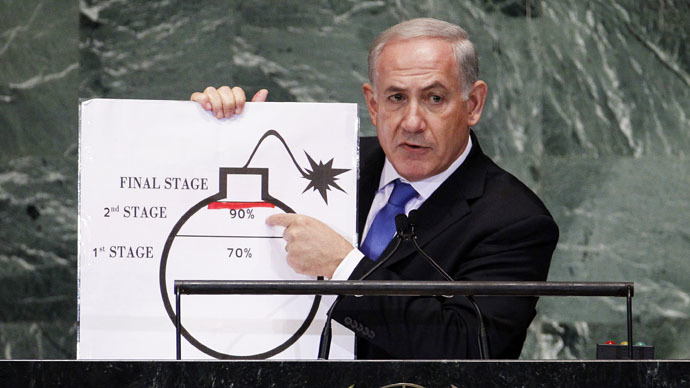Netanyahu's claims on Iran nuclear program contradicted Mossad findings – leaked docs

Israeli PM Benjamin Netanyahu's 2012 statement at the UN, in which he warned the world of Iran being too close to making a nuclear bomb, allegedly contradicted his country's intelligence assessments, according to leaked spy documents.
Netanyahu famously declared to the United Nations General
Assembly in September 2012 that Iran was 70 percent of the way to
completing its "plans to build a nuclear weapon," and
drew another "red line" at 90 percent, claiming Tehran's
first bomb would be ready "by next spring, at most by next
summer."
However, leaked Mossad documents suggest the country was much
further from such development.
READ MORE: Netanyahu warns America that Iran is an 'enemy', not a
partner
According to Spy Cables – a cache of hundreds of leaked secret
intelligence papers from all over the world, published by Al
Jazeera's Investigative Unit in collaboration with the Guardian
newspaper – at the time of Netanyahu's statement, Israel's
intelligence service concluded that Iran was "not performing
the activity necessary to produce weapons," estimating that
Iran had 100 kilograms of uranium enriched to a level of 20
percent.

"Even though Iran has accumulated enough 5 percent enriched
uranium for several bombs, and has enriched some of it to 20
percent, it does not appear to be ready to enrich it to higher
levels. It is allocating some of it to produce nuclear fuel for
the TRR [Tehran Research Reactor], and the amount of 20 percent
enriched uranium is therefore not increasing," said the
secret report, which Mossad shared with South
Africa's State Security Agency a few weeks after the prime
minister's UN speech.
READ MORE:China urges Iran to uphold its right to 'peaceful use of
nuclear power'
With world leaders worried by a possible nuclear threat, a series
of political decisions led to Iran's consent to neutralize or
destroy its enriched uranium under an agreement with the US,
Britain, China, Russia, France and Germany – the so-called P5+1
group.
Talks between world leaders on Iran's nuclear ambitions and
uranium enrichment capacity have taken place since sanctions were
imposed on Tehran in 2012.
Iran insists it has no nuclear weapons ambitions and seeks
enrichment capabilities to develop reactor fuel, and for other
peaceful purposes. However, the West believes Tehran has been
using its civilian atomic energy program as a cover for
developing a bomb.
READ MORE:Iran threatens nuclear enrichment expansion if US
pursues sanctions
Since the parties failed to reach a conclusion by the previous
deadline of November last year, Iran’s nuclear talks with the six
world powers carry on. Iran and P5+1 countries are expected to
reach a basic framework agreement by the end of March, with a
final accord due by June 30. Netanyahu plans to address the US
Congress next month to once again warn against a nuclear
compromise with Tehran.












